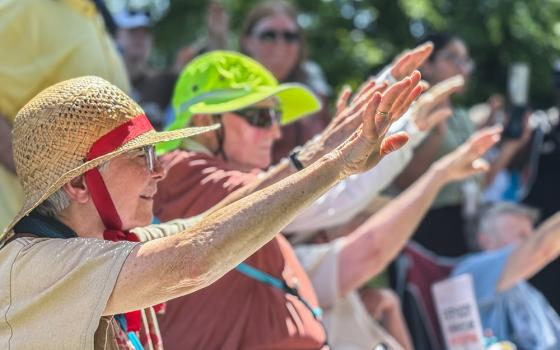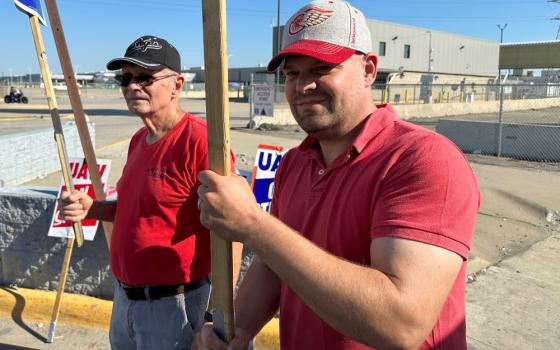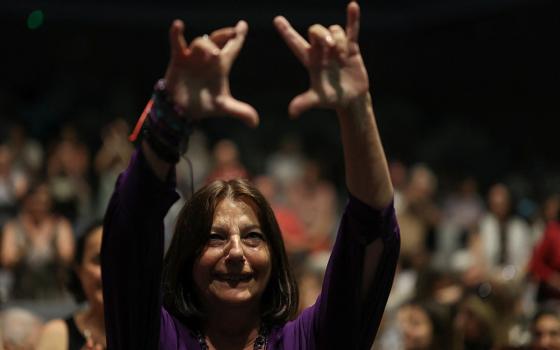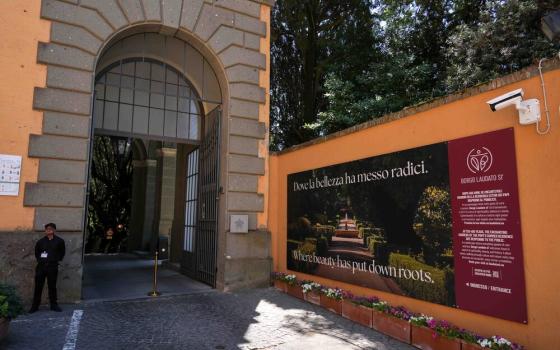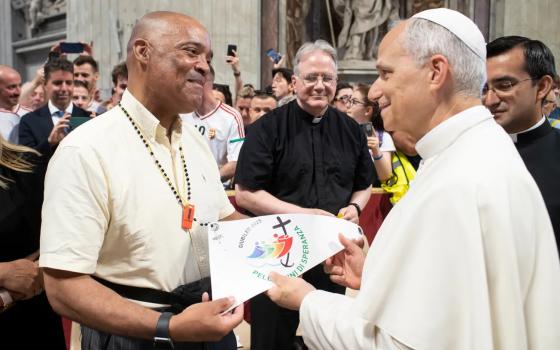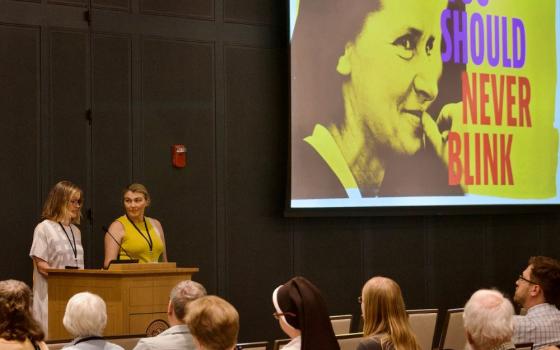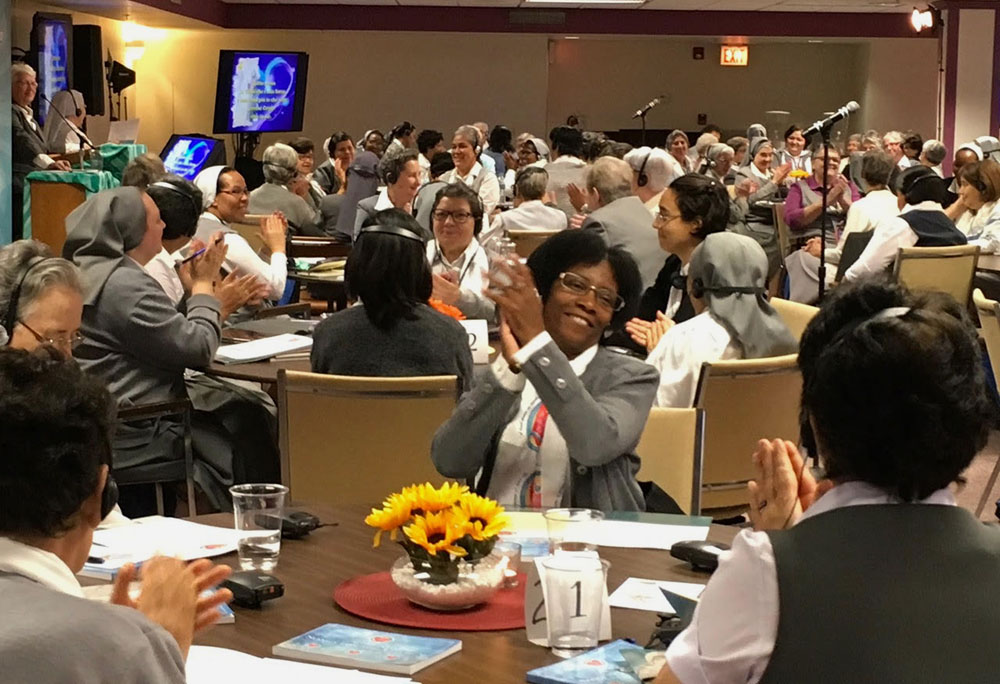
At their General Assembly in Chicago in 2017, Missionary Sisters of the Sacred Heart of Jesus celebrate consensus of ministry with and among refugees, single women and children in Rome; opening a new community in the refugee settlements in Dzaipi, Uganda; and extending themselves into collaboration with Solidarity with South Sudan. (Tere Merandi)
For this month, the panelists were asked to get our New Year off to a good start by bringing us into the mainstream of church reality. They reflected on this question:
Encouraged by Pope Francis, the church has embarked on a two-year journey (2021-23) in synodality. Reflect on the role of women's religious life in relation to the "spirituality of synodality." For example — in participation, communion or mission.
______
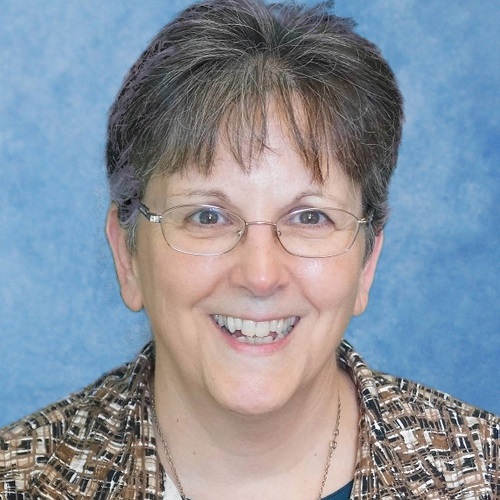 Beth Murphy is a Dominican Sister of Springfield, Illinois. With a background in journalism, communications and theology, she has worked mostly in communications ministry: diocesan communications director, manager of the National Coalition for Church Vocations' publishing arm, Communicators for Women Religious; and communications director for her religious community. In other ministries, she taught junior high, resettled Iraqi refugees in Detroit, and worked in a mostly Mexican parish in Chicago. She has been deeply engaged with the Iraqi Dominican sisters and friars and has traveled to Iraq four times.
Beth Murphy is a Dominican Sister of Springfield, Illinois. With a background in journalism, communications and theology, she has worked mostly in communications ministry: diocesan communications director, manager of the National Coalition for Church Vocations' publishing arm, Communicators for Women Religious; and communications director for her religious community. In other ministries, she taught junior high, resettled Iraqi refugees in Detroit, and worked in a mostly Mexican parish in Chicago. She has been deeply engaged with the Iraqi Dominican sisters and friars and has traveled to Iraq four times.
"It seemed good to the Holy Spirit and to us" (Acts 15:28).
There may not be a congregation of Catholic sisters in the world that hasn't relied on the wisdom of this single verse from the Acts of the Apostles at some critical point in its story.
For the founding sisters of my congregation, there were several such moments. The seminal one happened in the spring of 1875 when our founders learned their departure from Kentucky two years earlier was meant to separate them from the community. They were meant — from the beginning, apparently — to establish a new foundation in Illinois. If there was a memo about that, they missed it. So on that day, full of shock, confusion and grief, they had a choice to make: return to Kentucky and abandon their mission to the Irish immigrant children in Illinois, or stay to do the thing they were sent to do.
That day, after hours of private prayer and communal discernment, they chose the immigrant children in Illinois. Whether any of them uttered Acts 15:28 aloud, or whether it was even obliquely referenced in the course of deliberation is not the point. They were, clearly, accompanied by the Holy Spirit and in communion with one another as they discerned.
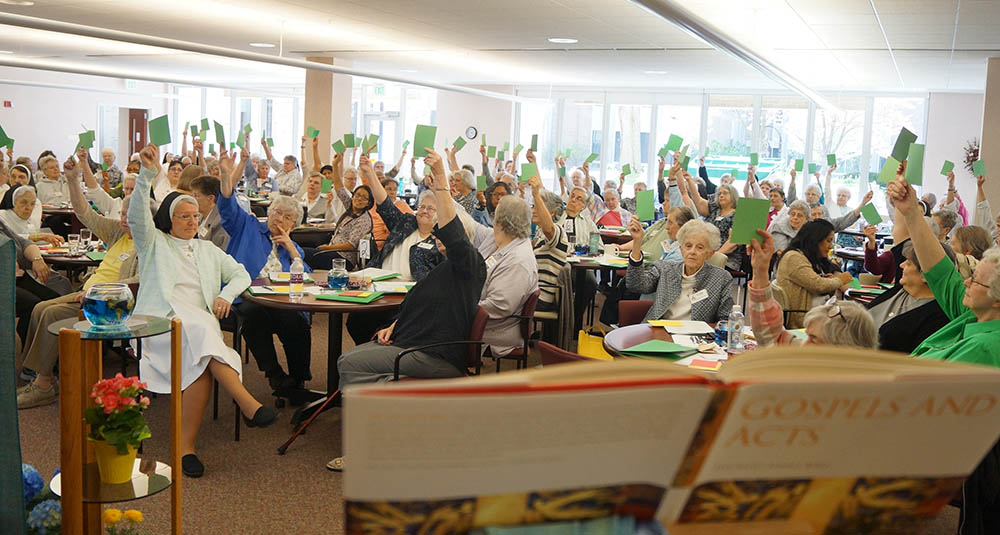
The Dominican Sisters of Springfield, Illinois, affirm a communal decision during a 2019 community meeting. (Courtesy of Beth Murphy)
Every congregation of sisters will have a similar story. To my mind, that is the gift Catholic sisters contribute to the synod on synodality: a long tradition of oboedire — leaning toward, listening to, and perceiving the new thing toward which God draws all of creation.
Oboedire is the root of the vow of obedience every consecrated woman makes. Especially in places where local ordinaries are less than enthusiastic about the synodal process — which Pope Francis once called "what the Lord expects of the Church in the third millennium" — women's congregations have a vital role to play. By virtue of that role, we have the privilege of submitting the same 10-page report on our local synodal efforts as do the bishops.
A prayer that is shaping my congregation's response to the needs of the world right now mentions the interconnectedness of the cosmos, our solidarity with the rostros concretos (the "real faces"), the freedom we seek to recognize Christ in the hidden and unexpected, and our desire to "listen deeply to one another and to the brokenness of the world."
If we — and other Catholic sisters — are faithful to that desire, at the end of this synodal process we should be able to say, along with the early Christian community: This seems good to us — and to the Holy Spirit, too.
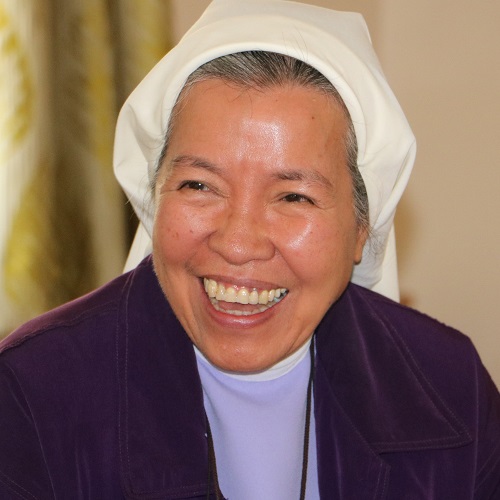 Vicenta Javier, a member of the Religious of the Assumption, is from the Philippines. After eight years of missionary work in Vietnam, she is now in her 11th year of missionary work in East Africa. She is an educator but has also been a formator of young sisters in the Philippines, Vietnam, Tanzania and Kenya. Currently, she teaches part time at the Center for Leadership and Management at Tangaza University College in Nairobi, Kenya.
Vicenta Javier, a member of the Religious of the Assumption, is from the Philippines. After eight years of missionary work in Vietnam, she is now in her 11th year of missionary work in East Africa. She is an educator but has also been a formator of young sisters in the Philippines, Vietnam, Tanzania and Kenya. Currently, she teaches part time at the Center for Leadership and Management at Tangaza University College in Nairobi, Kenya.
It was Feb. 17, 1981. I was a junior sister and we were thousands of women religious packed in the National Shrine of Our Lady of Perpetual Help. We were gathered to meet His Holiness Pope John Paul II on his first visit to the Philippines. His message seared itself into my mind and heart:
It has often been noted that there is a close connection between the fervor of the religious life of a country and the condition of the Church in that country: fervent religious life means a living and apostolic Church. ... If, by a mischance, tepidity and mediocrity were to set in, they would soon be reflected among the Christian people. On the other hand, throughout the history of the Church, when she has been assailed by crises, it has always been the religious life that has given the signal for a reawakening and a renewed fidelity to the Gospel.
Since then, I could never dissociate my religious life from the quality of Christian life of my people — of all people, because more than we can ever realize, the church, we, are all one. My life gives or diminishes life in the whole body. What a great responsibility and, too, a great privilege.
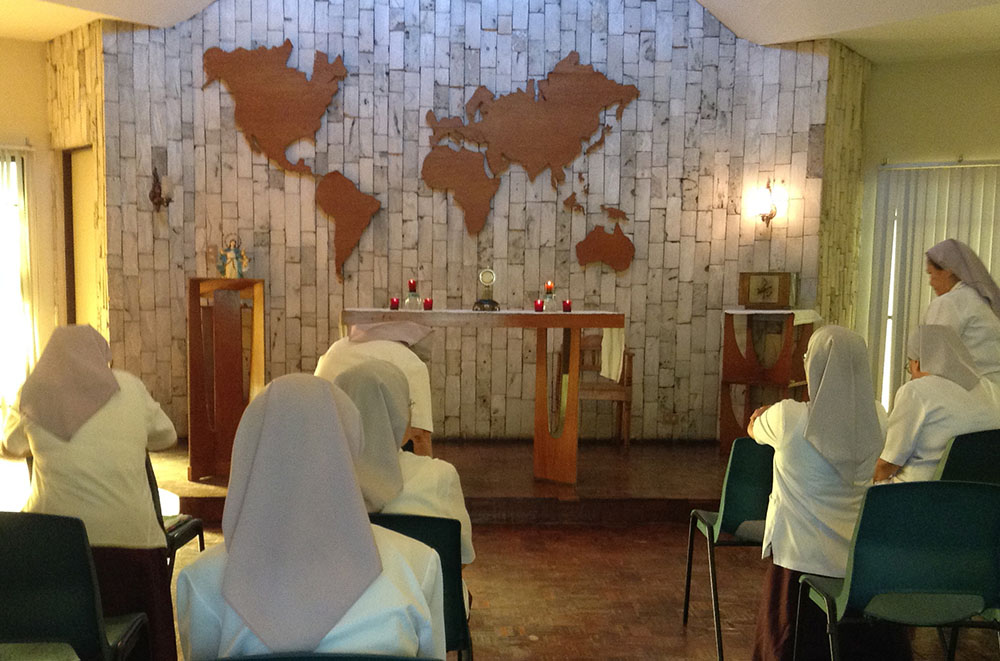
Religious of the Assumption sisters in the Philippines pray in their chapel. (Courtesy of Vicenta Javier)
After three synods on the family (2014), the youth (2018) and the Amazon (2019), Pope Francis launched the whole church into a journey of synodality. It is a beautiful word, a powerful word, but one that as Francis himself admits, is not easy to put into practice. Perhaps because it entails a challenging journey to be "relational, inclusive, pluricultural" in a church that has far too long been patriarchal, clerical, hierarchical.
In focus is the inclusion of youth, of women, of the laity to journey together. I ask myself, are we women religious ready for that? The challenge is to be at the frontlines of the conversion and reconciliation this necessitates.
A conversion that concretely starts with myself. To be willing to step out and accept roles of responsibility in the church, actively be part of the listening, reflection and discernment toward the birthing of a synodal church. To be midwives of the gift of a renewed church that God wants to give his people. The gift can only be welcomed by hearts that live this deep grace of conversion. It has always been religious life that has given the signal for a reawakening and a renewed fidelity to the Gospel.
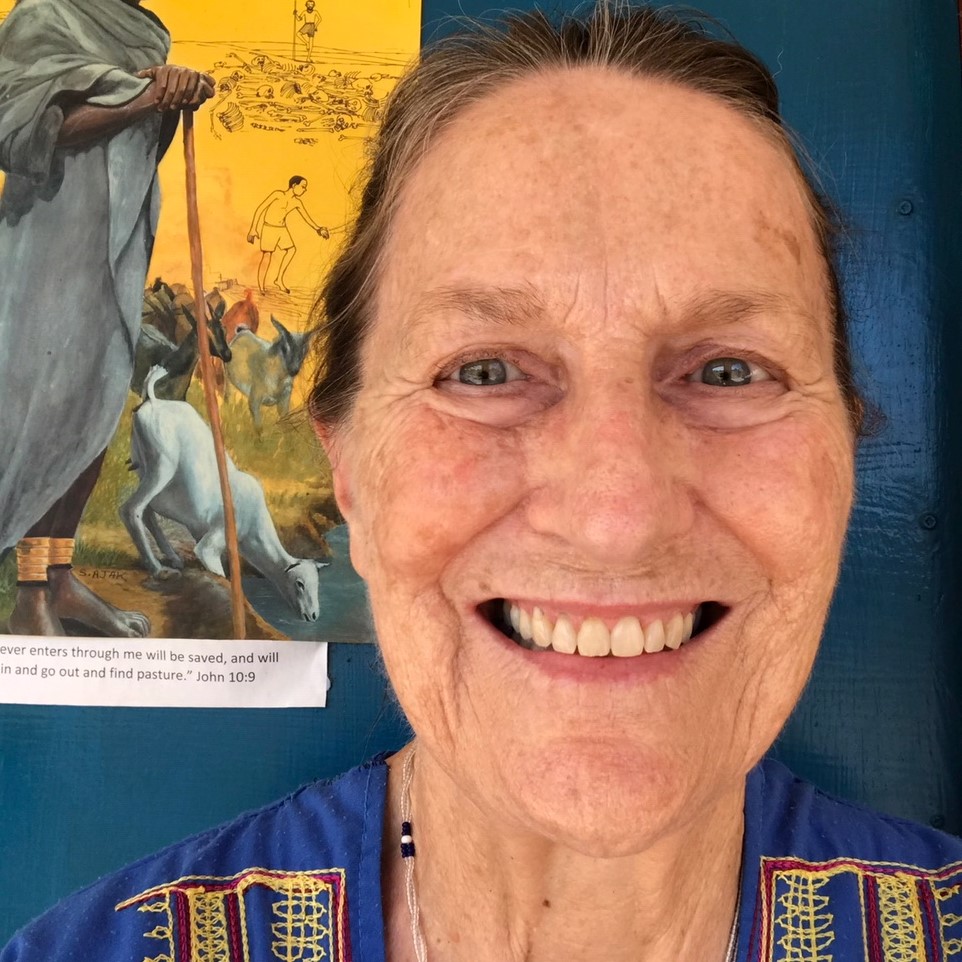 Thérèse Hope Merandi is an American-born and naturalized Brazilian Missionary Sister of the Sacred Heart of Jesus. With graduate degrees in theology and psychology, for 40 years she did formation work with various groups, including grassroots levels, in conflict areas, mostly in Latin American countries such as Nicaragua, Guatemala, Argentina, Cuba and Paraguay. She served in congregational general leadership and ministered for 20 years in African countries, including Ethiopia and Uganda. She is currently in South Sudan as part of the intercongregational pastoral team of Solidarity with South Sudan.
Thérèse Hope Merandi is an American-born and naturalized Brazilian Missionary Sister of the Sacred Heart of Jesus. With graduate degrees in theology and psychology, for 40 years she did formation work with various groups, including grassroots levels, in conflict areas, mostly in Latin American countries such as Nicaragua, Guatemala, Argentina, Cuba and Paraguay. She served in congregational general leadership and ministered for 20 years in African countries, including Ethiopia and Uganda. She is currently in South Sudan as part of the intercongregational pastoral team of Solidarity with South Sudan.
Pope Francis has a dream of the "church on the move," a "synodal" church. This journey — now in process — began in October 2021 and will continue through October 2023 into the Synod of Bishops.
From the Greek syn, "with," and odos, "path," the words synod and synodal take on a meaning of direction, a oneness on a path, toward a way of living and working together, whereby Jesus and his mission become more "recognizable" (Luke 24:13-35).
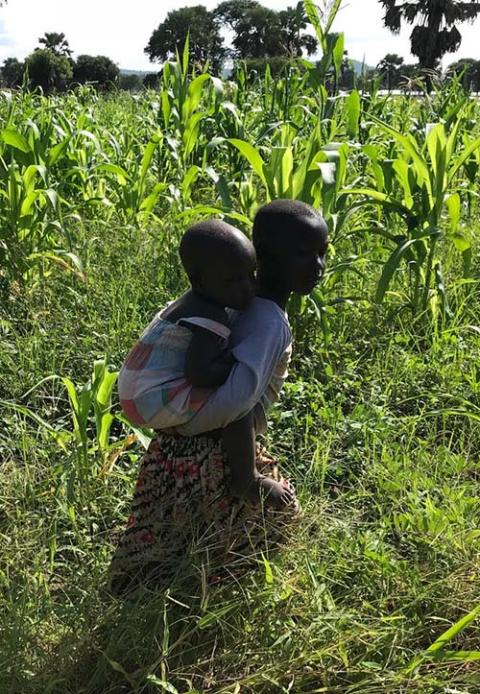
A little girl, Hanna, carries her younger sister to a community celebration in the refugee settlement in Paloyinya, Uganda. (Tere Merandi)
The Holy Spirit invites us into the rhythm of life and movement of the Trinity, a relationship — ever deepening, ever expanding, including, leaving no one or nothing outside the realm of creation, incarnation and redemption. The Spirit points out concrete steps, helping us descend to the grassroots level of life, sharing life as one humanity on this one planet, our home.
We are being called to a more visible communion. This involves and is made present through participation together in mission: assuming decisions that emphasize concretely a stepping out of our comfort zones to the needs and realities of our world. This "koinonia" (communion) requires being visibly present, involved, committed with, and listening to the cry of the poor, reaching out to those on the margins.
Communion with participation calls us to repentance and conversion from the systemic and structural sins so deeply rooted in our hierarchical supremacy; instead, we must take our stance alongside Jesus, bending/lowering ourselves to service/mission that learns from the Master: "I have given you an example so that you may copy what I have done to you" (John 13:12-17).
Synodality — the path of listening, discernment and dialogue — puts us at the arduous groundwork task of reforming mentalities and reforming structures, assuming the gradual, consistent, integrative process of building a Christian community.
Listening and being nourished together with the word and Eucharist; celebrating the challenges and rewards of building a faithful communion of brothers and sisters, we must be co-responsible/participative in ministries and roles that mutually respect and distinguish the life and the mission of the one body of Christ for his pilgrim people.
This synodal praxis builds a church (and a religious life) capable of communion — concretely and tenderly open to fraternity. She must be participative while at the same time keenly aware of subsidiarity, and faithful in all she proclaims and does, transparently revealing the face of him she serves.
Advertisement
Synodality is a call to listen to the Spirit to gather insights of all the faithful. We must amplify participation, expand freedom and allow the passion for the church's mission to soar in evangelization.
Reaching out, reaching in, extending beyond! (Isaiah 54:2-3)
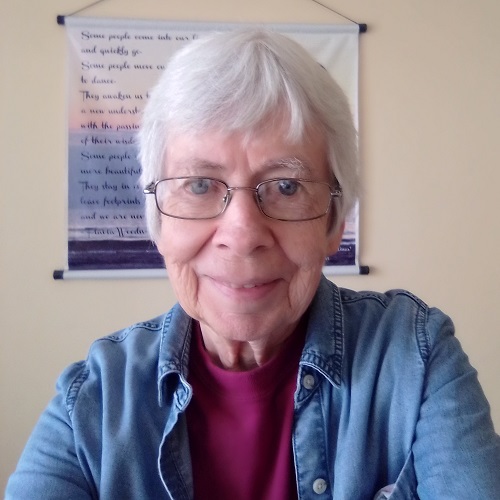 Sue Scharfenberger is an Ursuline Sister from Louisville, Kentucky. An educator, she ministered in rural Mississippi and for the last 42 years has been with the people in the coastal region and the Central Sierra of Peru. Her ministry has been with circles and communities of women around issues of empowerment, nonviolence and leadership. She has served as facilitator for various religious communities in Central and South America and the Caribbean and currently represents her congregation as mission promoter with parents and teachers at Santa Angela Merici School, founded by the Ursuline Sisters of Louisville in 1965 in Carmen de la Legua, Peru.
Sue Scharfenberger is an Ursuline Sister from Louisville, Kentucky. An educator, she ministered in rural Mississippi and for the last 42 years has been with the people in the coastal region and the Central Sierra of Peru. Her ministry has been with circles and communities of women around issues of empowerment, nonviolence and leadership. She has served as facilitator for various religious communities in Central and South America and the Caribbean and currently represents her congregation as mission promoter with parents and teachers at Santa Angela Merici School, founded by the Ursuline Sisters of Louisville in 1965 in Carmen de la Legua, Peru.
Do you remember? It was around the '60s and '70s when we were introduced to the vocabulary: hierarchy, collegiality, subsidiarity. The words circled around us and through us in our conversations, dreaming and debating. The words were not new, but they brought forth values that flowed through our communities, pulsating to a great extent because of Vatican II and the renewal of religious life and the church.
Do you remember "chapter rooms"? Monasteries, convents and cloisters were known to have them. They were meeting spaces where decisions were made — because in the origins of our congregations our foundresses envisioned a way of being together that involved participation, sharing of responsibilities, and the encouraging of initiatives.
By way of example, St. Angela Merici founded a "company" of women. The word speaks for itself. The women were to companion one another, journey together, share in one another's stories and plan for mission and ministry as times changed and realities invited new challenges.
Do you remember when rows of chairs in our gatherings were replaced with circular tables? We wanted to see one another as we debated ideas, proposed new directions. We transitioned from circular tables to circular models of government, of organizing ourselves.
The circular model meant more than a change in seating arrangement. We became more conscious of building community than adhering to a daily regimen. It fostered a different way of envisioning so that we could see with greater clarity the world around us. Our eyes were opened to the injustices in our societies, to the poverty and exclusion that many of our sisters and brothers experienced.
And as our eyes were opened so were our hearts.
History helps us get a perspective on where we are because of where and how we have been.
And so now, after several encyclicals and pastoral letters, Francis, the bishop of Rome, invites us to a "synodal" church. A synod is an assembly. Not new! But what is different in the invitation of Francis today is his calling us, all of us, first to listen. Circular tables do not do the trick. Neither do circular models.

(Unsplash/Nick Fewings)
What is necessary and what has been absent is precisely Francis' first step: becoming a listening church. And since church is everyone — not just priests, bishops, religious — and since many who are church are not found in churches, the invitation is to go to the margins of the circle and beyond to the "outsiders."
Francis invites us not only to a synod, but to become a synodal church: a community that reaches beyond itself to those whose voices have not been heard. We must first listen! And that is the greater challenge!
 Catherine Grasswill, originally from France, joined the congregation of the Ursulines of Jesus at the age of 37. She was chaplaincy coordinator in a French secondary school; worked for the Catholic Delegation for Cooperation in Cameroon; and evangelized and served as a principal in Cameroon. She accompanied young people to events like World Youth Day as well as the Taizé community in several countries. She has worked with the wives of deacons and currently shares life with Spanish and Canadian sisters while giving workshops and retreats for the Francophone community in Edmonton, Alberta, Canada.
Catherine Grasswill, originally from France, joined the congregation of the Ursulines of Jesus at the age of 37. She was chaplaincy coordinator in a French secondary school; worked for the Catholic Delegation for Cooperation in Cameroon; and evangelized and served as a principal in Cameroon. She accompanied young people to events like World Youth Day as well as the Taizé community in several countries. She has worked with the wives of deacons and currently shares life with Spanish and Canadian sisters while giving workshops and retreats for the Francophone community in Edmonton, Alberta, Canada.
In Matthew's Gospel, Jesus invites his contemporaries to look at the signs of the times (Matthew 16:3).
"Let us take the century as the Revolution gave birth to it: We are entering a new era!" These were the words of Louis-Marie Baudouin, priest and founder of the Ursulines of Jesus, around 1800, at the end of the French Revolution.
This priest was aware that he had to adapt to a new era. The needs of the women and men of his generation were very different from those of the years before the Revolution.
This man knew how to read the signs of his time, and invented a religious life outside the convents, committed to the people and families affected by the wars of Vendée.
We can say today, following his example: "Let us take the 21st century, as it is shaped by our present world."
Today, our world is marked by global warming, and its consequences on already-poor populations. There are people migrating to more socially and economically secure countries; Indigenous people who are ignored by people who colonized their lands; and the pandemic seems to have no end. Globally, internal wars sustain the arms trade, and within and outside the church we live with the pain of sexual abuse.
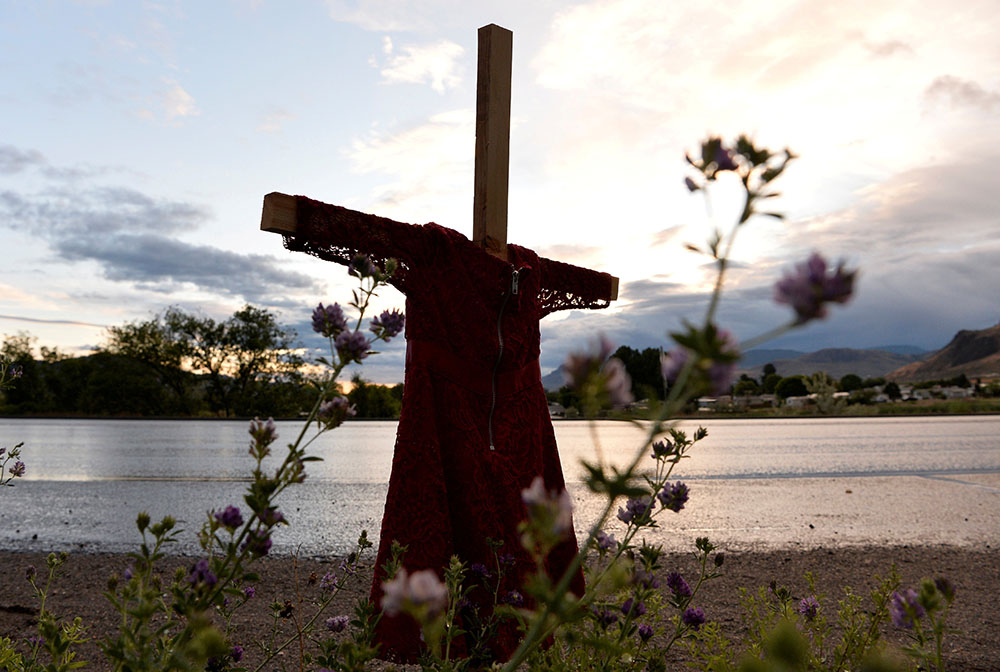
A child's red dress hangs on a cross near the grounds of the former Kamloops Indian Residential School in Kamloops, British Columbia, June 5, 2021. For years Indigenous people in Canada have wanted an apology from the pope — on Canadian soil — for the church's role in abuse at Catholic-run residential schools. (CNS/Reuters/Jennifer Gauthier)
Pope Francis said in his traditional greetings to the Curia in 2019 : This "change of times" requires a "change of pastoral mindset." He also warned against "rigidity" and "the temptation to fall back on the past" when we must engage in meaningful change.
With the synod on synodality, Francis is inviting all the women and men of the church — and even those who are not part of it — to a great consultation about the church. He knows that change is inevitable, but that it cannot be done without taking into account the whole people of God. He has invited us to listen, encounter, dialogue with each other, but also with others who are more on the margins of the church, as Jesus knew how to do on the roads of Galilee.
The institutional church is not alone in receiving the Holy Spirit to move forward in the search for God's desires for our time.
Let us walk together with Jesus on this new road to Emmaus (Luke 24:13-35) — once I heard a priest speculate in a homily that the two disciples might be Cleopas and his wife, Mary. And now the pope has appointed a woman undersecretary, a religious sister, with the right to vote! We must realize what this appointment brings to the whole church; it is the first time a woman has been given the right to vote in church governance for 2,000 years!
Let us hope that this synod on synodality will realize that we must take our time as having been birthed by its major issues.


